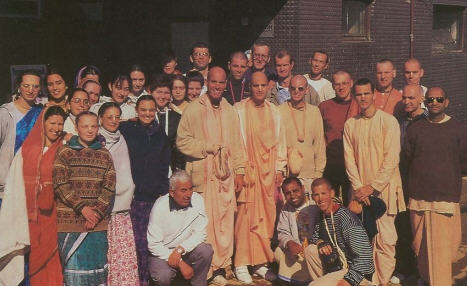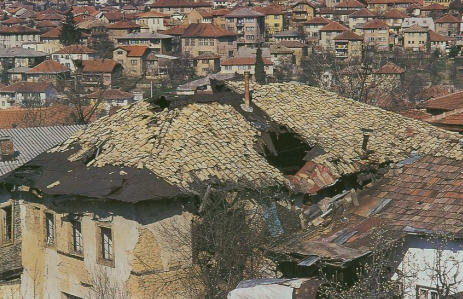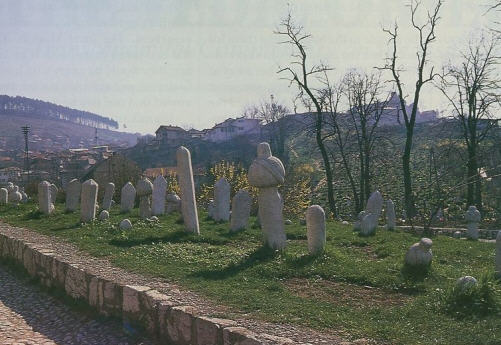
A visit to the Hare Krsna devotees in Sarajevo in the aftermath of the Bosnian war.
APPROACHING Sarajevo from the west through the mountains, we first drove through the suburbs of the city. As in many of the villages we'd been through in Bosnia, every building still standing bore the marks of war. As we drove into the city, the scene got worse. The entire city had been ravaged.
Most startling were the graveyards everywhere. Fifty thousand people had died, and because for years the city had been surrounded by enemy forces, the local people had been obliged to bury their dead within the city. There were graves in every available space. Most parks and gardens had become graveyards. Even little patches of land between buildings served as cemeteries for two or three bodies. On a corner tuft of grass near a traffic light, a cross or a Muslim tombstone might mark a single grave.
Eventually we arrived at the small ISKCON temple, in the Muslim sector of town. The fifteen local devotees greeted us with the chanting of Hare Krsna, which seemed especially bright and cheerful in contrast to the destruction around us. As I got out of the car, I saw that the temple had been riddled by bullets and shrapnel.
I knew some of the history of the Sarajevo temple; I had asked devotees in Croatia what the devotees in Bosnia had been through. So as we entered the temple I asked in particular about Jahnukanyaka Devi Dasi and Hamsahina Devi Dasi, two women who had lived in the temple alone through the most intense period of the war, from April 1992 to July 1994.
When Bosnia declared independence from the Yugoslavian Federation in April 1992, the Serbian army surrounded the city. Like all the citizens, Jahnukanyaka and Hamsahina were trapped and couldn't leave. Throughout the war most people stayed indoors to shield themselves from mortar attacks. But Jahnukanyaka and Hamsahina ventured outside daily to distribute books and prasadam door to door or to the few souls who braved mortar and sniper fire on the street.
The small temple became a shelter for Bosnian refugees from the hills, driven out of their homes by the advancing army. To live on the streets meant death, so all over the city people with homes or apartments gave shelter to others less fortunate. One day early in the war several families came to the temple and asked for shelter. Jahnukanyaka and Hamsahina couldn't refuse them, so fifteen guests lived in the temple throughout the war. The guests rose early so that Jahnukanyaka, Hamsahina and a few congregational devotees could have their morning devotional program. The guests also ate prasadam daily with the devotees.

Getting food and water was difficult during the war. All gas, water, and electricity were cut off by the Serbs. Each day Jahnukanyaka or Hamsahina would risk walking to different areas of the city where water might be available from a spring or an open pipe. They spent much of the day fetching water or getting food.
While others lived soiled and dirty throughout the war, Jahnukanyaka and Hamsahina always bathed daily, wore fresh clean saris, and kept the temple spotlessly clean. One man told them that in contrast to most people in wartime Sarajevo, they looked like angels living in hell.
During the war, many people in Sarajevo practically starved. But by Krsna's mercy Jahnukanyaka and Hamsahina had no shortage of food. Early in the war they had been begging door to door for foodstuffs when they heard that city officials were meeting with relief organizations to ration out food supplies from the United Nations. Jahnukanyaka and Hamsahina went to the meeting and made a plea: they were Hare Krsna devotees and wanted to distribute food. Because big organizations such as the Red Cross and the Red Crescent were at the meeting, the devotees had little chance of getting any support. City officials sent them home with nothing.
But the next day one of the organizers of the meeting came to the temple to say he had arranged one ton of food for the devotees' program—but the devotees would have to pick it up themselves and get it to the temple. Jahnukanyaka wondered how the two of them could accomplish such a task; they had no vehicle, and there was no public transportation.
The next day she visited the local Bosnian army base. Somehow she got to see the commanding general and convinced him to give a driver and a large truck to ferry the food from the UN depot to the ISKCON temple on the other side of the city. Within an hour the truck picked up the supplies and drove them to the temple, where neighbors spent the day loading the supplies into the temple attic. Mostly dry goods, the supply lasted almost the entire the war.
To help make supplies last, Jahnukanyaka and Hamsahina ate sparingly themselves. They would bake cookies or bread every day, and after offering the food to Krsna they would go out to schools, hospitals, and refugee centers to distribute the prasadam. They would even go to Bosnian army positions on the front lines of the war, some three hundred meters outside the city. Bosnian soldiers would be amazed to see two women in saris approaching them in their foxholes with cakes and cookies. The soldiers would sometimes have to pull the two women down to get them out of the way of a hail of enemy bullets.
Within the first few months of the war, all the trees of the city had been cut down for fuel, leaving only stumps. To heat the temple, Jahnukanyaka and Hamsahina would go out at night and chop away at the stumps for wood.
They also distributed Srila Prabhupada's books. Just before the war had begun, a large supply of Srila Prabhupada's books had arrived in Sarajevo. They had been meant for all the Hare Krsna temples in Yugoslavia, but because the fighting started soon after the books arrived, the books were stuck in Sarajevo.
The house in which the books were stored was taken over by people unfriendly to the devotees. So when Jahnukanyaka visited the house to see the condition of the books, she found the people in the house using them for fuel. When she pleaded with the people not to do that, they drove her away at gunpoint. That same day, she went back to the army base and begged the general's help in rescuing Srila Prabhupada's books. Once again he submitted to her purity and determination and sent soldiers and vehicles. Within hours the books were safely in the temple compound.

Jahnukanyaka and Hamsahina would go out daily to distribute books, often at great risk to their lives. Snipers had taken up key positions around the city, and women and children were targets. While moving about the city, Jahnukanyaka and Hamsahina sometimes had to step over bloodied corpses. But they went on distributing Srila Prabhupada's books throughout the entire war.
Many times, soldiers threatened their lives. One time the leader of a rebel faction of Bosnian Muslim soldiers had Jahnukanyaka kidnapped and brought to his headquarters. Because she had been seen near the Serbian part of the city (she had been distributing prasadam there), they thought she was a Serbian spy. While interrogating her, the rebel leader swore he'd kill her. Fearless, she told him that she was a devotee of Lord Krsna and that Krsna would protect her. Besides that, she said, she and Hamsahina were distributing food daily to their Muslim neighbors. The local Muslims knew this and loved them for it. If he killed her, they would be angry with him. He hesitated and then let her go, but he vowed that one day he would kill her.
Jahnukanyaka and Hamsahina passed up rare opportunities to flee the city, because they had found that the war made people more receptive to Krsna consciousness. The devotees had their service to their spiritual master, and they were there to stay.
During the entire war they kept the temple open, ministered to a growing congregation, and distributed books and prasadam. At the time they were both uninitiated devotees. Only after the war was over and they were able to travel freely to Croatia did they finally receive spiritual initiation.
So you can understand my eagerness to meet these two saintly devotees upon my arrival. But as I was being escorted to my room, the devotees told me I'd have to wait a few hours more: Jahnukanyaka and Hamsahina were out on the streets of Sarajevo, distributing Srila Prabhupada's books.
Indradyumna Swami spreads Krsna consciousness in Poland, the Commonwealth of Independent States, and other parts of the world.
To know more about Indradyumna Swami, visit www.indradyumnaswami.com
